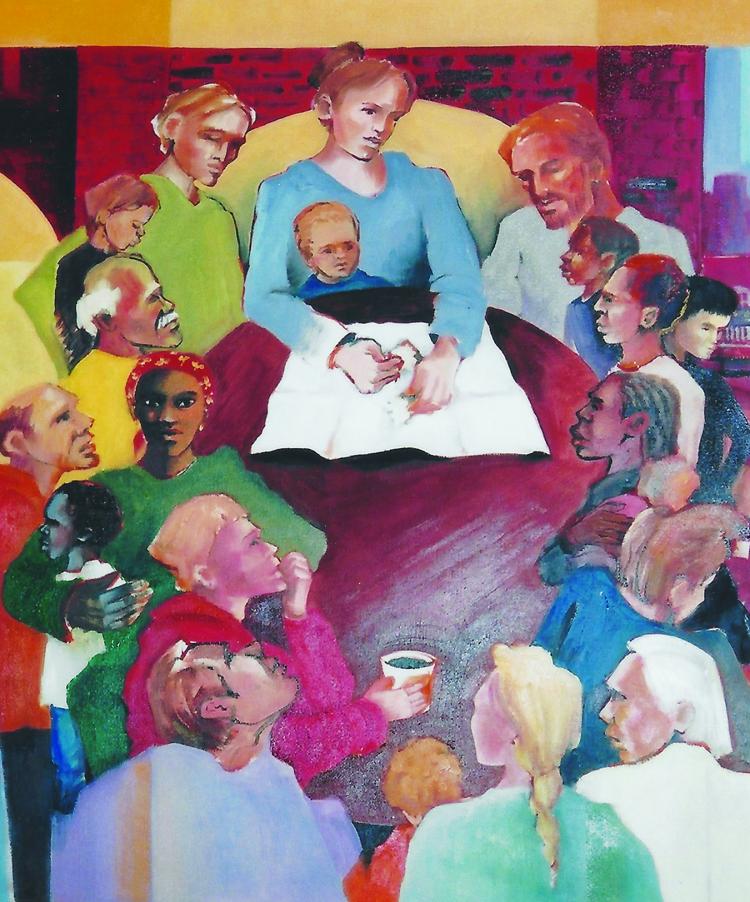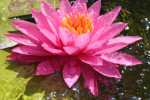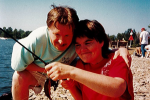I am, as Isaiah prophesied,
the voice of one crying out
in the wilderness,
"Make straight the way of God."
—John 1:23
It was not what I expected to have happen at a White House Conference in Washington, D.C. on the relationship of the faith community to race relations in the United States. But because of that meeting I began to realize what Christmas is really all about. We were Black, White, and Brown, Muslims, Hindus, Christians, Bahai and Native Americans called together to discuss the relationship of religion to race. Ironically enough, it was the Indian chief who taught me the meaning of Isaiah.
Into the midst of the theological meanderings of those of us who wanted to write another paper, have another meeting, take another workshop to combat racism, the Indian chief brought the message of Isaiah again. He stood up slowly, folded his hands quietly in front of him, looked out over our heads and said softly, "I have spent my life teaching our children to say 'thank you': Thank you for the grass. Thank you for the rain. Thank you for the stranger. Thank you for all the people of the world. I think that if we learn to say 'thank you' for everything, we will come to realize its value, to respect it, to see it as sacred."
It was a simple speech but it had a kind of cataclysmic effect on my soul. It gave me pause. It made me think. It raised the specter of Isaiah in me all over again. It made me think newly about what the Scriptures are really talking about when they tell us to "make straight the way of God." I suddenly realized that Christmas is time to shout "thank you."
Christmas is the commitment to life made incarnate. It is the call to see God everywhere and especially in those places we would not expect to find glory and grace. It is the call to exult in life.
Christmas is the obligation to see that everything leads us directly to God, to realize that there is no one, nothing on earth that is not the way to God for me. I knew instantly that the moment we begin to really celebrate Christmas, to look at everyone and everything as a revelation of God, to say "thank you" for them, that racism would be over, war would be no more, world hunger would disappear, everything would be gift, everyone would be sacred.
Indeed, it is simple but oh, so clear: All we have to do to "make straight the way of God" is to say "thank you," to learn to live intensely, to have a zeal for life, to develop a passion for life.
This year when you open a gift at Christmastime, when you say "thank you," remember that this particular gift is only meant to be a reminder of the goodness of God calling you to be the voice crying in the wilderness that gives passionate thanks for everything, for everyone, in life.
We need a passion for life, a surge of gratitude, so deep that we will do whatever it takes to guarantee the fullness of life for the entire world.
The Koran teaches: “None of you will believe till you want for your brothers and sisters what you want for yourself.” The call to humanity to have a passion for humanity is God’s great call through every major religion, of course, but certainly through the Jesus who walks through life as a healing presence wherever he goes.
Whatever you do, do it with passion. Otherwise why do it at all?
When a sense of zeal leaves our life, it is time to begin again, because whatever we have been doing up to now, has clearly died in us.
is what is left over after mere duty is done. Passion is what wakes us up when we think we are too tired to go on.
"There’s plenty of fire," Rachel Field wrote, "in the coldest flint." If we want to revive something within us, we must begin to give thanks for it again.
So many times in life we find ourselves merely going through the motions, doing things because we think we have to do them. And that’s probably true. But it is just at those moments that we most need to develop some new outlets, plan some new experiences and begin some new activities. Otherwise the weight of dry responsibilities may well damp the fires of the heart that we ourselves have allowed to die. When the fire of zeal goes out, the lamp of life goes out with it.
Christmas reminds us that God gives us one chance after another in life to become new again, to let things grow in us, to birth in ourselves fresh and different ways to God.
The saddest thing in life is to lose interest in it. When we can learn to say thank you for the hot coffee, thank you for the quiet, thank you for the children whose energy taxes our own, then we are on our way to tasting life, to wallowing in it, to letting it run down our faces into our mouths and then, to laugh out loud about the whole thing.
A child in a manger is God’s way of telling us that life is a process of eternal newness, unending openness, and passion without end.
The German philosopher Hegel wrote, "Nothing great in the world has been accomplished without passion." In fact, I am inclined to think that nothing normal has been either. It takes passion—commitment to something, love for something, devotion to something—just to turn the Mondays of life into periods of doable duty.
It is only the risk of enthusiasm that makes life livable. People who wait to be coaxed into life have really stopped living it years ago for whatever the reason. “Convince me,” “make me,” “prove it”—people sit and wait for life to come to them. But the real trick to life is to make it out of nothing but the intensity we carry in our own hearts for it.
Whatever it is that stirs our souls is what measures the quality of our lives, makes a claim on our time and fills our minds no matter what else we may seem to be doing.
To go through life without zeal for something is to go through life half-awake, half-engaged, half-alive. When we realize that, it’s not really a problem. When we don’t, it can be terminal.
The question passion asks of every human being is not: For what are you willing to die? That one would be easy. The real question passion asks of us is: For what are you willing to live? Beware any answer that sounds like “I don’t know.”
To be able to be exuberant about something is one of life’s greatest gifts. Never take it for granted. Nurture it. Give in to it at all times, no matter who goes tsk, tsk behind you. Exuberance may be the only proof we have that we are really alive.
Exuberance is infectious. What excites you will eventually excite the rest of the world. We are all simply a microcosm of the world. Whatever you and I want we must ourselves become or how can it ever become real anywhere else?
The poet Edna St. Vincent Millay wrote what may be the irrefutable answer to people whose first thought is self-protection. Millay said, “My candle burns at both ends; / It will not last the night; / But, ah, my foes, and oh, my friends— / It gives a lovely light!” It is possible that the world has far too few of those.
Bethlehem and the manger were foolish. Nazareth and the carpentry were foolish. Galilee and the lepers were foolish. But the energy of them marked the world, gave it new vision, raised its hope. If we live without being foolish about something great we can, of course, live very comfortably. The question is, Will we have lived well?
Passion is not pallid and not dour. Passion is what gives meaning to what seems meaningless, energy to what seems impossible, direction to what is scattered. Without passion we only wander through life, we do not proceed with purpose. So how can we ever be sure that we got where God intended us to go?
The Rule of Benedict, an ancient document, warns against the pitfalls of "bitter zeal." There is, the Rule states, “A zeal that leads to life.” And presumably, therefore, a zeal that leads to death. So how, in our intensity, do we tell the difference? Good zeal is the passionate pursuit of anything that leads to the good of the rest of the world, harms no one and gives hope to many. It is a baby born in a manger who dies on a cross.
Thomas Fuller writes: “Zeal without knowledge is fire without light.” It is not enough to be passionate about something. It is also necessary to understand it.
Zeal is not chauvinism; it is ardor. It is the kind of love that moves mountains to save a single soul.
The philosopher Kierkegaard wrote, “What our age lacks is not reflection but passion.” We know a lot of things in this world now: how many poor children there are in the center of our cities, how many families lack insurance, lack health care, lack homes, how many people go to bed hungry at night. But where is the passion that turns the birth of Jesus into the life of Jesus?
When we really get passionate about something, someone will invariably tell us to "be reasonable," "stay cool," "calm down." It’s such a clever way of controlling a person. The thing Isaiah wants us to learn is that we must never be cool, calm or reasonable about the irrational. The manger reminds us that it is our responsibility to make God’s will possible in life. Or as Henry S. Haskins says, “Good behavior is the last refuge of mediocrity.”
Balzac says, “Passion is universal humanity. Without it religion, history, romance and art would be useless.” I say they would be impossible, nonexistent, invisible, too.
Don’t be afraid of passion. It is passion that really drives us to make possible what would otherwise be completely impossible if we followed our minds instead of our feelings.
Thought changes nothing. Feeling does.
The wag put it this way: “We are all in the same boat with Christopher Columbus. He didn’t know where he was going when he started. When he got there he didn’t know where he was. And when he got back he didn’t know where he’d been.” So enjoy. Wherever you are, whatever is going on in your life right now is the birthing place of God for you. Say thank you.
We are at the beginning of a century in which the whole world is in a state of rebirth. Be passionate about God’s will for every living thing: every wetland, every ocean, every child, every inner city, every woman, every moment of life. Live passionately. Live intensely. Live with enthusiasm. Make straight the way of God.
Let’s Share Our Thoughts
1. Which of these reflections on “gratitude and passion” was most meaningful or challenging to you? Explain.
2. Reflecting on John the Baptist’s cry in the wilderness, “Make straight the way of the God.” (John 1:23) Sister Joan writes, “All we have to do to ‘make straight the way of God’ is to say, ‘thank you,’ to learn to live intensely, to have zeal for life, to develop a passion for life.” Which of these four practices for making straight the way of God is characteristic of your life? How? Be specific.
3. “Whatever you do, do it with passion,” Sister Joan counsels. Name one thing you do with passion. How has this shaped your life in positive ways? How does this passion “wake you up when you think you are too tired to go on?”
4. Sister Joan offers readers a countercultural way to think about the meaning of Christmas when she writes: “Christmas reminds us that God gives us one chance after another in life to become new again, to let things grow in us, to birth in ourselves fresh and different ways to God.” How does this impact your current understanding of Christmas? Practically, what might this mean for how you celebrate Advent and Christmas this year?
5. Make Sister Joan’s final passage your New Year’s resolution: “Be passionate about God’s will for every living thing: every wetland, every ocean, every child, every inner city, every woman, every moment of life. Live passionately. Live intensely. Live with enthusiasm. Make straight the way of God.” Make this your resolution for 2022 and name two or three specific ways you will bring it to life in the coming year. Then once a week, once a month, revisit the resolution and name how you are living up to what you resolved to do. Happy New Year, indeed!
Let’s Listen to Other Voices
Idea 1
Benedictine spiritual guide, Brother David Steindl-Rast, like Sister Joan, has something challenging to say about the importance of gratitude, of seeing a deep sacredness in the words “thank you.”
He writes:
People usually think that gratitude is saying thank you, as if this were the most important aspect of it. The most important aspect of the practice of grateful living is trust in life. Every human being every day has to make a practical choice between trusting life or not trusting life. Again and again in life, one is tempted to distrust and fear. Fear and distrust—this is the same.
If you try distrusting life and always questioning life, you find that it makes you absolutely miserable. Or you can try trusting life and whatever comes up, saying, “Well, maybe I don’t like it but I trust that life gives me good things—that life is trustworthy.” To live that way is what I call “grateful living” because then you receive every moment as a gift. And really the gift within the gift is opportunity. This is when you stop long enough to ask yourself, “What’s the opportunity in this moment?” You look for it and then take advantage of that opportunity. It’s as simple as that. –Brother David Steindl-Rast
Prompt: Having been inspired to live a grateful, passionate life by Brother David and Sister Joan this Christmas, compose a prayer, poem or song that expresses how you will celebrate Christmas “differently” as this sacred season unfolds.
Idea 2
“Let us be grateful to the people who make us happy; they are the charming gardeners who make our souls blossom.” —Marcel Proust
Prompt: The holidays are a great time to say “thank you” to neighbors and friends and family and the poor. Take time to show people why you appreciate them. You could write them a letter, invite them to lunch for the conversation, bake them cookies, send them an e-card, give them a gift, do an act of extraordinary generosity for those who are suffering and hungry…. After doing this ask yourself: how did it feel to show appreciation for someone? Did you change in any way?
Idea 3
Here are two quotes on gratitude from the mystics Rumi and Meister Eckhart:
“Wear gratitude like a cloak, and it will feed every corner of your life.”—Rumi
“If the only prayer you said was thank you, that would be enough.”—Meister Eckhart
Prompt: Using these quotes as a reference, create a collage of gratitude for the year 2021. In your collage, include the many things you are thankful for from the past year.
Let Us Pray
This month memorize and repeat this short prayer of gratitude whenever you can.
One more day to serve.
One more hour to love.
One more minute to praise.
For this day I am grateful.
If I awaken to the morning sun, I am grateful.
– Mary Lou Kownacki, OSB
JOAN CHITTISTER is an internationally known author and lecturer and a clear visionary voice across all religions. She has written more than 60 books and received numerous awards for her writings and work on behalf of peace and women in the church and in society.
HELEN DAVID BRANCATO, IHM is a painter, printmaker and illustrator whose work carries themes of justice, peace and poverty. An associate professor of art at Villanova University, she has presented workshops on spirituality and compassion around the country. Through painting, Helen David brings the depth of her insight into the pain, strength and dignity of her subjects.

 Artwork: Eucharist by Helen David Brancato, IHM
Artwork: Eucharist by Helen David Brancato, IHM




